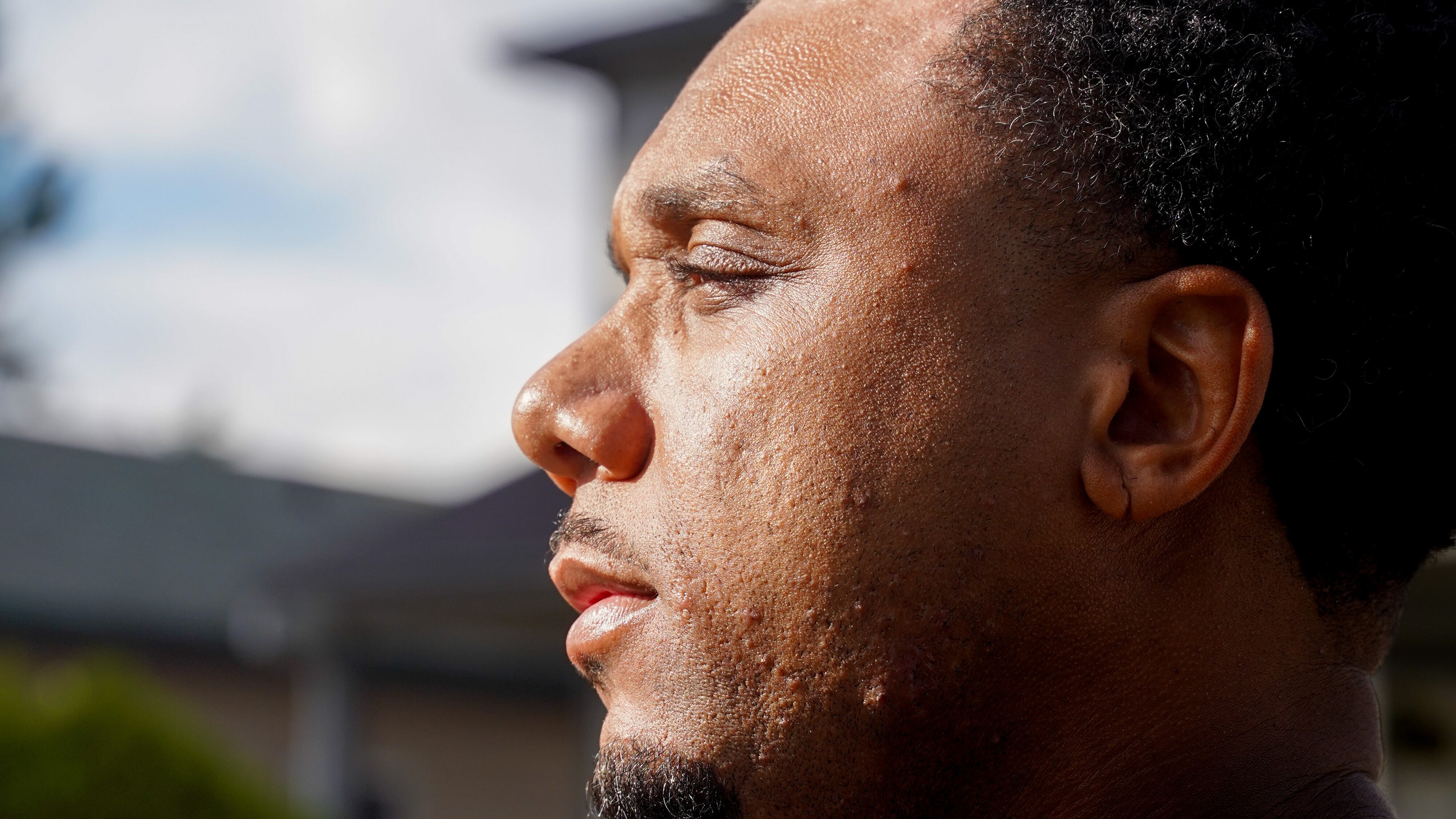Last September, on the 100th consecutive night of Portland protests against police brutality, Elijah Warren says a seemingly anonymous riot cop struck him in the back of the head with a baton, sending him to the hospital.
Number 67: That’s the only way Warren, 37, could describe the officer who he says struck him soon after he left his home to complain about tear gas wafting through his windows. The number—inscribed on the back of the officer’s helmet—was the only identification visible on his uniform that evening.
To this day, the city has refused to disclose the officer’s identity. But now Warren is suing the city. And for the first time, an officer has been named as a defendant in connection with the Sept. 5 incident: Detective Erik Kammerer.
THE LAWSUIT: On May 25, Warren filed a $400,000 lawsuit in Multnomah County Circuit Court against the city of Portland for negligence and battery. The complaint gives a narrative of what happened on the late summer evening in the Mill Park neighborhood.
On Sept. 5, the complaint says, Warren was home in his East Portland residence when his son and his son’s friend began screaming as they attempted to wash their eyes in the sink. Nearby, the Portland Police Bureau had deployed tear gas into a crowd of protesters. It seeped into Warren’s home, prompting him to go outside and tell police what had happened. He began conversing with an officer. The lawsuit says that’s when Kammerer struck Warren behind the ear.
“An officer was listening to plaintiff when defendant Kammerer hit plaintiff in the head from behind with a baton, causing injury,” the complaint says. “After Kammerer hit plaintiff, other police officers pulled Kammerer away and told him that plaintiff was a homeowner.”
“As a result of the above-described battery,” the complaint continues, “plaintiff suffered a concussion, a laceration to his right ear, which required sutures, and suffered, continues to suffer, and may permanently suffer from pain, humiliation, feeling of racial stigmatization, and fear of police.”
The complaint alleges the city was negligent in failing to adequately train, discipline, transfer or terminate Kammerer and other unnamed officers “who used unlawful force.”
“The City further knew that by its pattern and practices of failing to discipline or terminate Kammerer and other unreasonably violent police officers,” the lawsuit says, “that Kammerer was likely to assume that he was substantially above the law, and that this was likely to encourage him to engage in unlawfully violent or threatening encounters with civilians.”
The lawsuit alleges the city of Portland should have anticipated such a reaction from Kammerer due to “prior instances of Kammerer’s misuse of force,” though it does not elaborate on the alleged prior incidents.
The city attorney declined to comment and the Police Bureau did not respond to a request for comment.
WHY IT MATTERS: The lawsuit is the first time Kammerer has been formally accused of hitting Warren. It follows reporting by WW last November that first named Kammerer as the officer wearing helmet number 67.
If the city finally acknowledges that Kammerer is the officer who struck Warren, it could call into question his role testifying about police use of deadly force before grand juries. As WW previously reported, Kammerer is a homicide detective who has repeatedly testified in grand jury proceedings regarding fatal shootings by police, including the deaths of Aaron Campbell, Keaton Otis, Andre Gladen and Quanice Hayes. (All of the officers in those shooting deaths were exonerated.)
Kammerer is still active on the force as a detective and is currently investigating the most recent non-fatal shooting by a police officer on Saturday, May 22 in the Sunderland neighborhood.
Warren, a Black single father, says the lawsuit is about more than him and the injuries he suffered.
“My biggest thing is, I hope it actually makes an impact,” he tells WW. “It’s really not about me, it’s more for my son and the future of other young Black kids growing up in Portland.”
More specifically, Warren wants to see meaningful police reform at the Oregon Legislature. “I really hope it helps with police accountability and pushing that forward,” Warren says. “I just hope the case actually helps push that forward and makes a statement.”
Greg Kafoury, the Portland attorney representing Warren, says Kammerer’s alleged actions and lack of discipline to date highlight the importance of Senate Bill 621, which seeks to change state law so that Portland can establish a new police oversight board approved by voters last November—without having to bargain with the police union.
“That would be an earth-shaking change in the power relationships between the people and those who are sworn to serve and protect,” Kafoury says of the bill’s potential passage.
Rep. Janelle Bynum (D-East Portland) has been publicly vocal on Warren’s situation, using his personal story as an argument for police reform bills.
“I’m glad Mr. Warren is seeking justice. It’s been too long,” Bynum says. “The conclusion that I can draw from my experience in advocating for him is the situation is complicated and perhaps unnecessarily so. It’s not something we have to accept [as] the status quo going forward, so I hope that there will be a good outcome.”
Kafoury says Warren’s lawsuit brings the city closer to holding Portland police accountable—even when the city conceals officers’ identities and fails to discipline them. “Every lawsuit that involves police brutality,” Kafoury says, “increases the pressure for the city and police department and the Legislature to do the right thing.”

